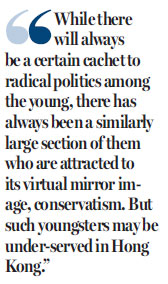Hong Kong needs to forge a conservative youth movement
Updated: 2016-10-20 07:40
By Jon Lowe(HK Edition)
|
|||||||
Jon Lowe writes that an ideological counterweight should be formed to offset the radical and liberal posturing prevalent among our young
Politics in Hong Kong of late has been characterized by bursts of radicalism. In this intensifying narrative, young "localists" have graduated to full-blown pro-independence advocates, while students have taken to a culture of protest. Disruptive academics and politicians - and, it is rumored darkly, outside agencies - have mined deeper and deeper ideological holes into which they herd their young charges, while around them builds an ominous backlash. A recent China Daily article headlined "Concern voiced about advocacy of separatism in schools" noted that "parents are deeply concerned about activities advocating 'Hong Kong independence' on campuses, as they fear their children could be criminally liable and harm their future prospects by contributing to the spread of the ideology". Instead of merely advocating common sense, civic responsibility and patriotism, Hong Kong needs to sharpen its ideological response to radicalism.

The most obvious counter-ideology is conservatism. Hong Kong's pro-establishment camp is a quasi-conservative grouping that shares the values of social stability, patriotism and pragmatism with other conservative groups around the world. For a good 60 years or so, conservative groupings such as the US Republican Party or the British Conservative Party have operated in opposition to a "liberal status quo". They favor social stability over a "socially progressive" agenda - and thus they champion traditional family values, are tough on crime and advocate fiscal responsibility. Ethically, conservatism is a broad church but what the different denominations share above all is a belief in fixed values, be they religious, patriotic or libertarian. This is in opposition to modern liberals and radicals who strive for continuous re-evaluation of society and its mores. Fiscally, conservatives usually endeavor to keep taxes low, and frown on welfare culture - again in opposition to liberals and radicals. In other words, conservatism centers on responsibility, both moral and financial.
The unfortunate truth is that radical politics appeals to the fire, idealism and inexperience of young people. In Hong Kong, local political notions such as "HK independence" are lumped together with similarly ludicrous and fashionable ideas emanating from the liberal-leaning humanities departments of universities. These include outlandish theories about gender, mutant feminism and the championing of all kinds of "minorities" (including some new sexual ones which the rest of us have been blissfully unaware of). Thanks in large part to a lot of failed academics from the West who have imported their useless ideas on social theory, there is nothing many of our students like more than a good debate about "transgender politics" or "third-wave feminism" (which is rather different from the honest women's liberation older generations will remember), or to rebel against perceived forms of "oppression". Hence many of them will join any old march against "authority" at the drop of a hat. Last year, University of Hong Kong students took it upon themselves to cause a near-riot over the issue of the Chief Executive's legitimate chancellorship of the public universities. The students had decided to become outraged on behalf of a cabal of dissident law lecturers, one of whom had been rejected as a pro-vice-chancellor. The students attempted to oust the CE from the role by the force of screaming and vandalism. In the West, such people have mockingly been called "social warriors" or even "social justice warriors", for that is essentially how they see themselves.
While there will always be a certain cachet to radical politics among the young, there has always been a similarly large section of them who are attracted to its virtual mirror image, conservatism. But such youngsters may be under-served in Hong Kong. The pro-establishment camp is an ad hoc group splicing the old patriotic front parties such as the Democratic Alliance for the Betterment and Progress of Hong Kong and the Hong Kong Federation of Trade Unions with the conservative pro-business elites such as the Liberal Party. Their ability to negotiate and compromise among themselves is commendable, but such shades of grey may not always be attractive to young people. Some students in search of a philosophy to counteract that of the "social warriors" that surround them may feel intellectually isolated.
Hong Kong youth could benefit from its own conservative spearhead that seeks to frame discussions in a way that opposes radicalism. While "social warriors" are extremely censorious of everyone else's behavior but their own, conservatism generally comes with a libertarian streak tempered by pragmatism that will appeal to sober young people. Meanwhile, conservatism's focus on personal responsibility may well appeal to youngsters tired of seeing riots and mayhem in the city.
Such values would give them ammunition against both the political radicals spurred up by outside forces and the academics who have imported the destructive values of European and American critical theory. A new conservative youth movement could help restore some balance and sanity amid the radical and liberal posturing prevalent among our young.
The author is a seasoned journalist who has worked in many places in the world.
(HK Edition 10/20/2016 page8)